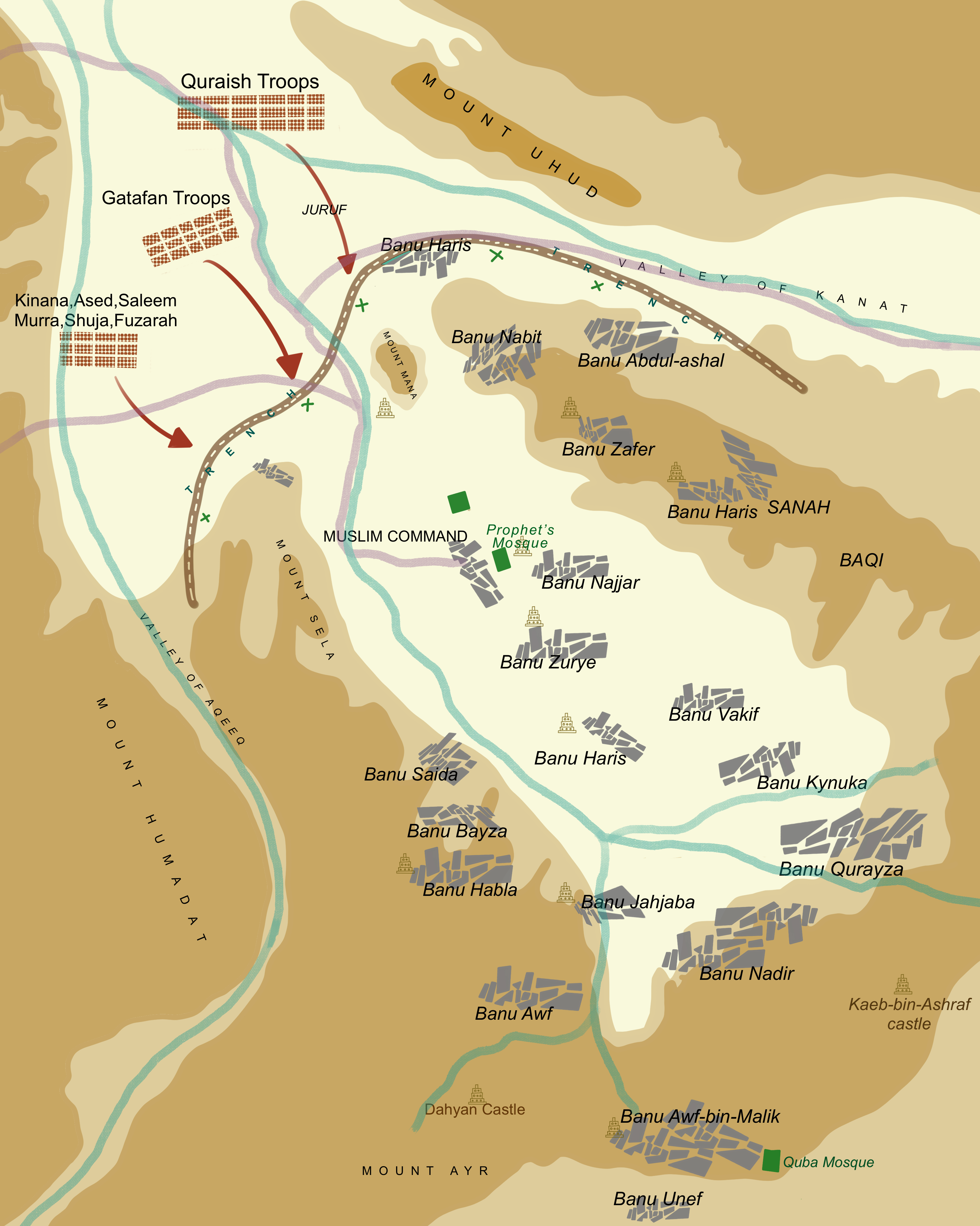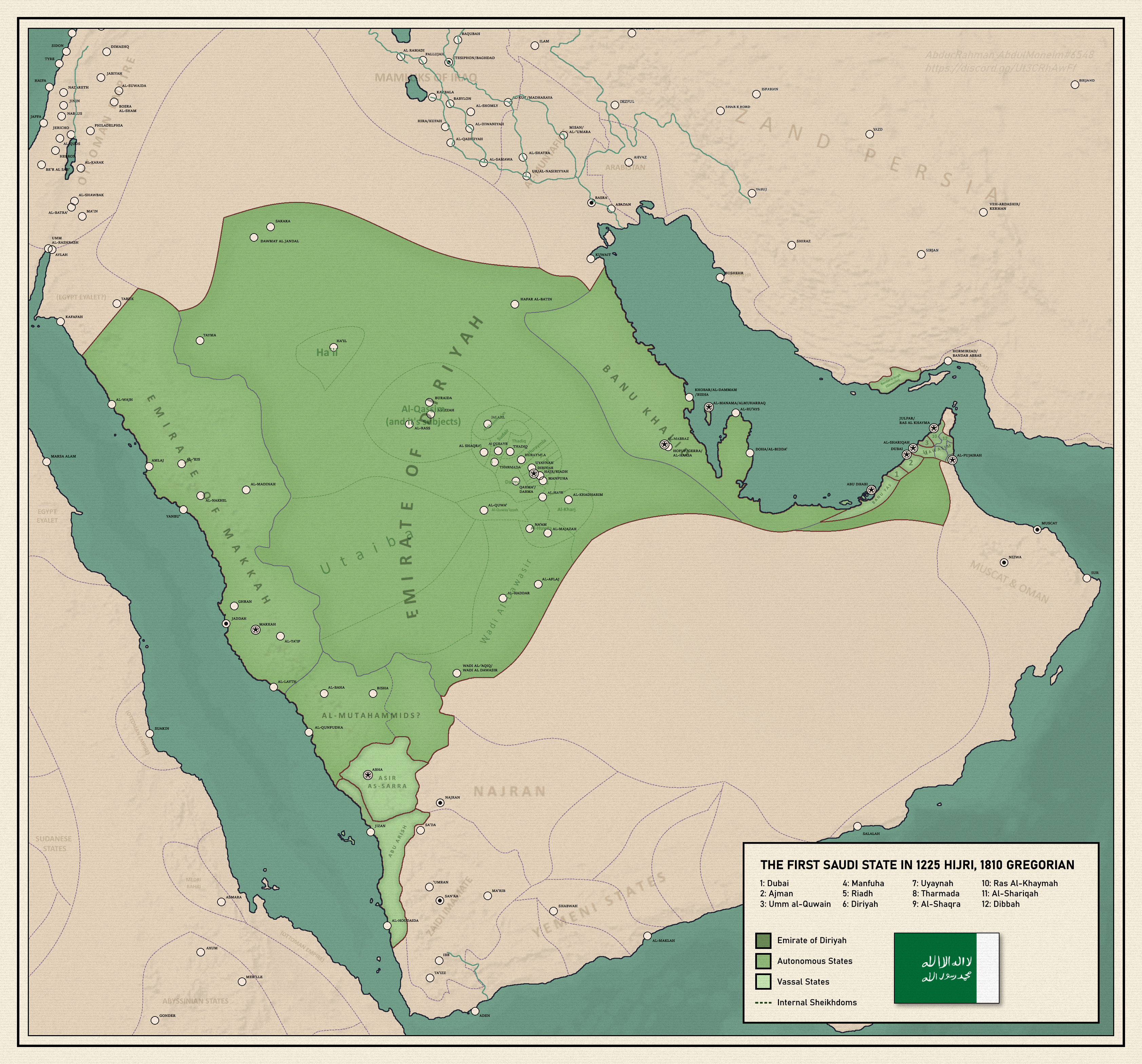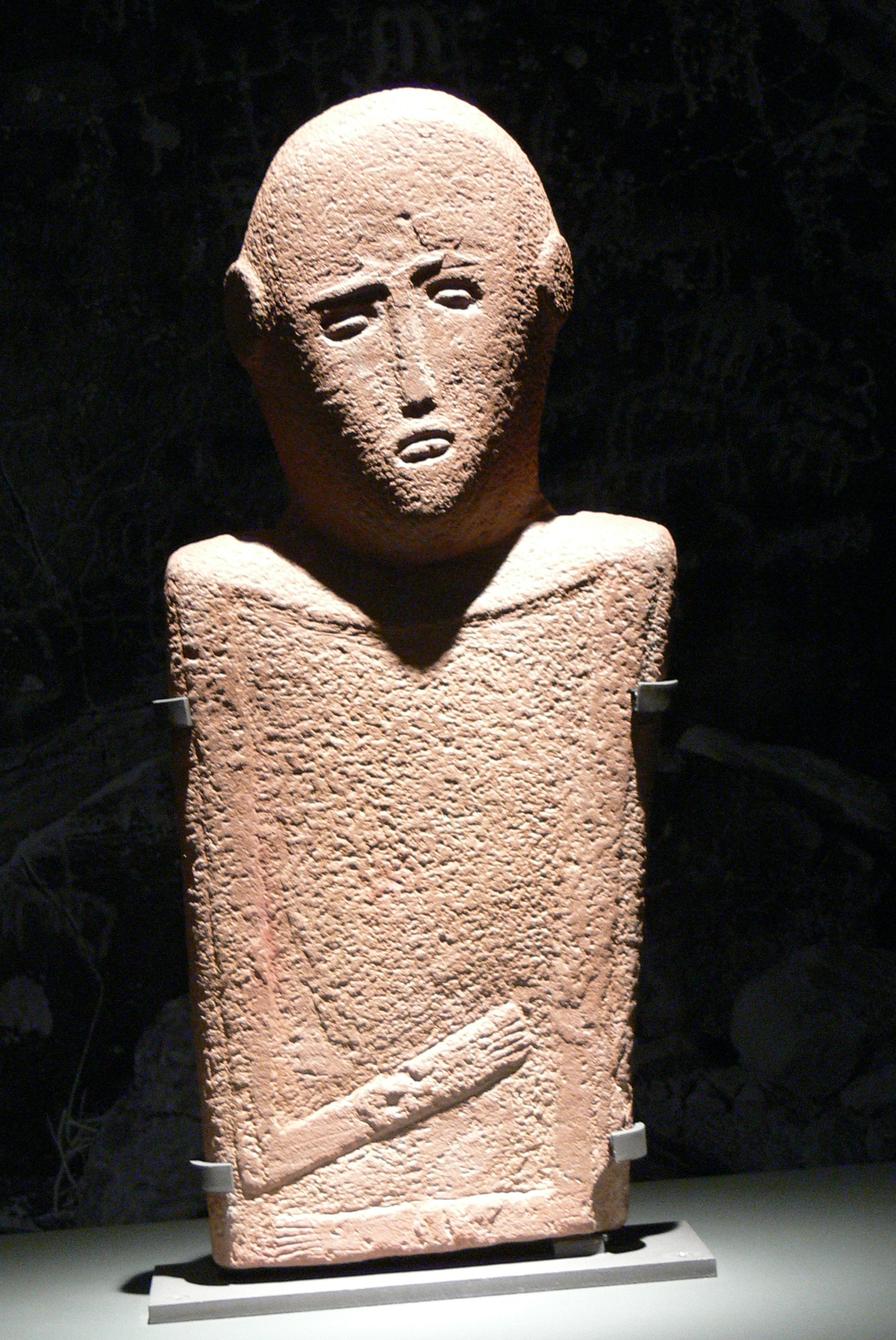|
Battle Of Zhu Qissa
The Battle of Dhu al-Qassah took place in the area of Dhu al-Qassah, located approximately east of Medina, in the Medina Province, in the central-western part of Saudi Arabia, from July 25 to July 30, 632. It pitted the forces of the Rashidun Caliphate led by Caliph Abu Bakr As-Siddiq against the rebel apostates led by General Hibal ibn Khuwailid,.Brother of Tulayha ibn Khuwaylid. This battle, comprising four engagements,, resulted in a victory for the Rashidun Caliphate, marking the beginning of the Wars of Apostasy, the withdrawal of the apostate rebels to the Abraq area,,,A place associated with the Banu Dhubyan tribe in the Nejd region of Saudi Arabia, now a steep rocky promontory located north of Al Hinakiyah. and a consolidation of Abu Bakr As-Siddiq's legitimacy in his new role as caliph. Background Situation following the death of Prophet Muhammad After the death of the Prophet of Islam, Muhammad, on June 8, 632,, Abu Bakr As-Siddiq was appointed as the succe ... [...More Info...] [...Related Items...] OR: [Wikipedia] [Google] [Baidu] |
Ridda Wars
The Ridda Wars were a series of military campaigns launched by the first caliph Abu Bakr against rebellious Arabian tribes, some of which were led by rival prophet claimants. They began shortly after the death of the Islamic prophet Muhammad in Islam, Muhammad in 632 and concluded the next year, with all battles won by the Rashidun Caliphate.Laura V. Vaglieri in The Cambridge History of Islam, p.58 In September 632, Laqit, the leader of the Banu Azd tribe, prepared an army to attack Oman. However, commander Hudhayfah al-Bariqi, Hudayfa's forces defeated Laqit and his rebel army. The next month, more rebel attacks were faced in Northern Arabia and Yemen, which were also defeated. A few months later, Banu Hanifa's chief Musaylimah, a rival prophet claimant with an army of allegedly 40,000 soldiers, was killed in the Battle of Yamama. The last major rebel attack came from the tribe of Kinda (tribe), Kinda in Hadhramaut in January 633. The campaigns came to an end in June 633 as Abu ... [...More Info...] [...Related Items...] OR: [Wikipedia] [Google] [Baidu] |
Zubayr Ibn Al-Awwam
Al-Zubayr ibn al-Awwam ibn Khuwaylid al-Asadi (; ) was an Arab Muslim commander in the service of the Islamic prophet Muhammad and the caliphs Abu Bakr () and Umar () who played a leading role in the Ridda Wars, Ridda wars against rebel tribes in Arabia in 632–633 and later participated in early Muslim conquests of Muslim conquest of Persia, Sasanid Persia in 633–634, Muslim conquest of the Levant, Byzantine Syria in 634–638, and the Exarchate of Africa in 639–643. An early convert to Islam, Zubayr was a commander in the Battle of Badr in 624, in which the latter was instrumental in defeating the opponent forces of the Quraysh. He participated in almost all of the early Muslim battles and expeditions under Muhammad. In the Battle of the Trench, due to his military service, Muhammad bestowed the title ''Hawari Rasul Allah'' ('Disciple of Messenger of God') upon him. After Muhammad's demise, Zubayr was appointed as a commander, in the Ridda Wars, by caliph Abu Bakr. He was in ... [...More Info...] [...Related Items...] OR: [Wikipedia] [Google] [Baidu] |
Zakat
Zakat (or Zakāh زكاة) is one of the Five Pillars of Islam. Zakat is the Arabic word for "Giving to Charity" or "Giving to the Needy". Zakat is a form of almsgiving, often collected by the Muslim Ummah. It is considered in Islam a religious obligation, and by Quranic ranking, is next after prayer (''salat'') in importance. Eight heads of zakat are mentioned in the Quran. As one of the Five Pillars of Islam, zakat is a religious duty for all Muslims who meet the necessary criteria of wealth to help the needy. It is a mandatory charitable contribution, often considered to be a tax.Muḥammad ibn al-Ḥasan Ṭūsī (2010), ''Concise Description of Islamic Law and Legal Opinions'', , pp. 131–135. The payment and disputes on zakat have played a major role in the history of Islam, notably during the Ridda wars. Zakat on wealth is based on the value of all of one's possessions. It is customarily 2.5% (or ) of a Muslim's total savings and wealth above a minimum amount known ... [...More Info...] [...Related Items...] OR: [Wikipedia] [Google] [Baidu] |
Muhammad
Muhammad (8 June 632 CE) was an Arab religious and political leader and the founder of Islam. Muhammad in Islam, According to Islam, he was a prophet who was divinely inspired to preach and confirm the tawhid, monotheistic teachings of Adam in Islam, Adam, Noah in Islam, Noah, Abraham in Islam, Abraham, Moses in Islam, Moses, Jesus in Islam, Jesus, and other Prophets and messengers in Islam, prophets. He is believed to be the Seal of the Prophets in Islam, and along with the Quran, his teachings and Sunnah, normative examples form the basis for Islamic religious belief. Muhammad was born in Mecca to the aristocratic Banu Hashim clan of the Quraysh. He was the son of Abdullah ibn Abd al-Muttalib and Amina bint Wahb. His father, Abdullah, the son of tribal leader Abd al-Muttalib ibn Hashim, died around the time Muhammad was born. His mother Amina died when he was six, leaving Muhammad an orphan. He was raised under the care of his grandfather, Abd al-Muttalib, and paternal ... [...More Info...] [...Related Items...] OR: [Wikipedia] [Google] [Baidu] |
Al Hinakiyah
Al Hinakiyah () is one of the List of governorates of Saudi Arabia, governorates in Al Madinah Region, Saudi Arabia. References Populated places in Medina Province (Saudi Arabia) Governorates of Saudi Arabia {{SaudiArabia-geo-stub ... [...More Info...] [...Related Items...] OR: [Wikipedia] [Google] [Baidu] |
Nejd
Najd is a historical region of the Arabian Peninsula that includes most of the central region of Saudi Arabia. It is roughly bounded by the Hejaz region to the west, the Nafud desert in al-Jawf to the north, ad-Dahna Desert in al-Ahsa to the east, and Rub' al-Khali to the south, although its exact boundaries cannot be determined due to varying geographical and political limits throughout history. Administratively, Najd is divided into three main regions: the Riyadh region which features Wadi Hanifa and the Tuwaiq escarpment, which houses easterly Yamama with the Saudi capital, Riyadh since 1824, and the Sudairi region, which has its capital in Majmaah. The second region, Al-Qassim, houses the fertile oases and date palm orchards spread out in the region's highlands along Wadi Rummah in central Najd with its capital in Buraidah, the second largest Najdi city, with the region historically contested by the House of Rashid to its north and the House of Saud to its east ... [...More Info...] [...Related Items...] OR: [Wikipedia] [Google] [Baidu] |
Banu Dhubyan
Dhubyan or Banu Dhubyan () are an Arabian tribe of Ghatafan branch, one of the Adnani branches. Banu Dhubyan inhabited the Hijaz region. Influential people of Dhubyan * Al-Nabigha Al-Nābighah (), al-Nābighah al-Dhubiyānī, or Nābighah al-Dhubyānī; real name Ziyad ibn Muawiyah (); was one of the last pre-Islamic Arabian poets. "Al-Nabigha" means genius or intelligent in Arabic. Biography His tribe, the Banu Dh ... References Dhubyan {{Asia-ethno-group-stub ... [...More Info...] [...Related Items...] OR: [Wikipedia] [Google] [Baidu] |
Tulayha Ibn Khuwaylid
Tulayha ibn Khuwaylid ibn Nawfal al-Asadi () was a wealthy Arab clan chief and military commander during the time of Muhammad; he belonged to the Banu Asad ibn Khuzaymah tribe. In 625 he was defeated in the Expedition of Qatan, a Muslim expedition against him. He also took part in the Battle of the Trench in 627 against Muhammad and in Battle of Buzakha and Battle of Ghamra in 632 against Rashidun caliphate. He later submitted to the caliphate and participated in the Battle of al-Qadisiyyah, Battle of Jalula, and the Battle of Nahavand on the Muslim side. He along with Amr ibn Ma'adi Yakrib were praised by Umar for their strength in battlefield and military wisdom during the Muslim conquest of Persia. Biography In 631, Tulayha claimed to be a prophet and the recipient of divine revelation and rebelled against Muhammad. Thus, Tulayha became the third person to claim prophethood among the Arabs against Muhammad. Many tribes acknowledged him as a prophet, which made him sufficien ... [...More Info...] [...Related Items...] OR: [Wikipedia] [Google] [Baidu] |
Saudi Arabia
Saudi Arabia, officially the Kingdom of Saudi Arabia (KSA), is a country in West Asia. Located in the centre of the Middle East, it covers the bulk of the Arabian Peninsula and has a land area of about , making it the List of Asian countries by area, fifth-largest country in Asia, the largest in the Middle East, and the List of countries and dependencies by area, 12th-largest in the world. It is bordered by the Red Sea to the west; Jordan, Iraq, and Kuwait to the north; the Persian Gulf, Bahrain, Qatar and the United Arab Emirates to the east; Oman to the southeast; and Yemen to Saudi Arabia–Yemen border, the south. The Gulf of Aqaba in the northwest separates Saudi Arabia from Egypt and Israel. Saudi Arabia is the only country with a coastline along both the Red Sea and the Persian Gulf, and most of Geography of Saudi Arabia, its terrain consists of Arabian Desert, arid desert, lowland, steppe, and List of mountains in Saudi Arabia, mountains. The capital and List of cities ... [...More Info...] [...Related Items...] OR: [Wikipedia] [Google] [Baidu] |
Tabari
Abū Jaʿfar Muḥammad ibn Jarīr ibn Yazīd al-Ṭabarī (; 839–923 CE / 224–310 AH), commonly known as al-Ṭabarī (), was a Sunni Muslim scholar, polymath, historian, exegete, jurist, and theologian from Amol, Tabaristan, present-day Iran. Among the most prominent figures of the Islamic Golden Age, al-Tabari is widely known for his historical works and expertise in Quranic exegesis, and has been described as "an impressively prolific polymath".Lindsay Jones (ed.), ''Encyclopedia of religion'', volume 13, Macmillan Reference USA, 2005, p. 8943 He authored works on a diverse range of subjects, including world history, poetry, lexicography, grammar, ethics, mathematics, and medicine. Among his most famous and influential works are his Quranic commentary, '' Tafsir al-Tabari'', and historical chronicle, '' Tarikh al-Tabari''. Al-Tabari followed the Shafi'i school for nearly a decade before he developed his own interpretation of Islamic jurisprudence. His understanding of ... [...More Info...] [...Related Items...] OR: [Wikipedia] [Google] [Baidu] |
Agha Ibrahim Akram
Agha Ali Ibrahim Akram (22 September 1923 — 4 March 1989) better known as A. I. Akram, was a Pakistani former three-star rank general, military strategist, historian, diplomat, and one of Pakistan's most influential military historians. In the 1980s, Akram was a well-known defence expert and defence analyst. His most popular work was his biography of Khalid ibn al-Walid, ''The Sword of Allah'', which he published while serving in the Pakistan Army. For several years, it was compulsory reading in the Pakistan Army for admission into the Command and Staff College Quetta and has been on the leadership syllabus in the Malaysian Army. Akram was once seen as a close confidant and conceptual adviser of President Zia-ul-Haq. He served in several key positions including as Pakistan's Permanent Military Representative to CENTO in Ankara, sixth Colonel Commandant of the Frontier Force Regiment, Deputy Martial Law Administrator of Zone F ( NWFP) under President Yahya Khan and Preside ... [...More Info...] [...Related Items...] OR: [Wikipedia] [Google] [Baidu] |
Abd Al-Rahman Ibn Awf
ʿAbd al-Raḥmān ibn ʿAwf (; born ʿAbd Amr ibn ʿAwf; ) was one of the companions of the Islamic Prophet Muhammad. One of the wealthiest among the companions, he is known for being one of the ten to whom Paradise was promised. Background His parents were both from the Zuhra clan of the Quraysh tribe in Mecca. His father was Awf ibn Abd Awf and his mother was al-Shifa bint Abdullah. His original name was Abd Amr ("servant of Amr"). It was Muhammad who renamed him Abd al-Rahman ("servant of the Most Merciful"). It is also said that his original name was Abdul Kaaba. His name has also been transliterated as Abdel Rahman Ibn Auf. He married Habiba bint Jahsh, whose entire brethren joined Islam. Biography Abu Bakr spoke to Abd al-Rahman about Islam, then invited him to meet Muhammad, who heard his declaration of faith and taught him the Islamic prayers. This was before the Muslims had entered the house of Al-Arqam; Abd al-Rahman was one of the first eight men to accep ... [...More Info...] [...Related Items...] OR: [Wikipedia] [Google] [Baidu] |







